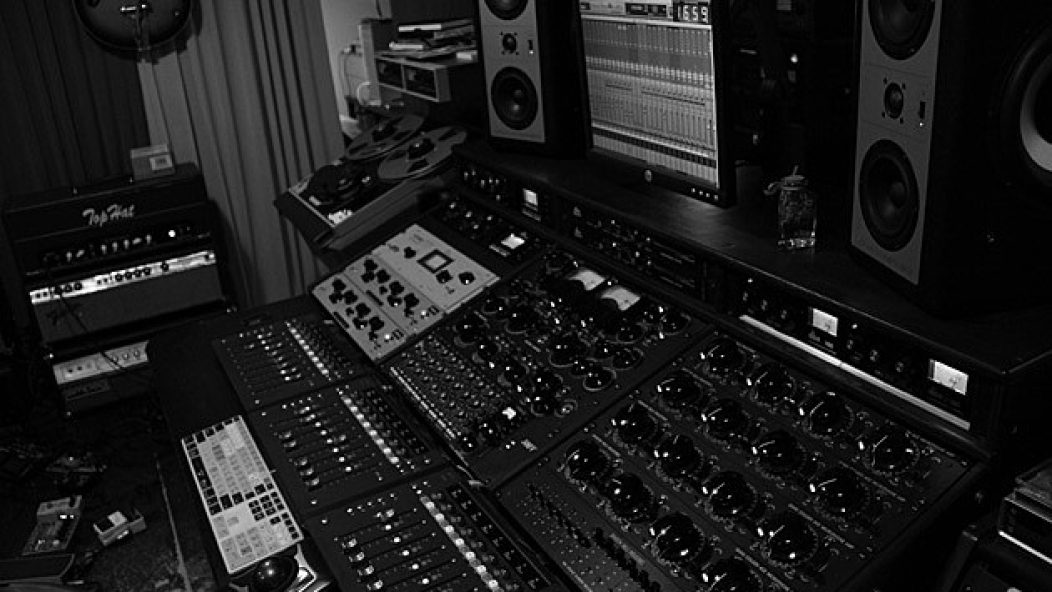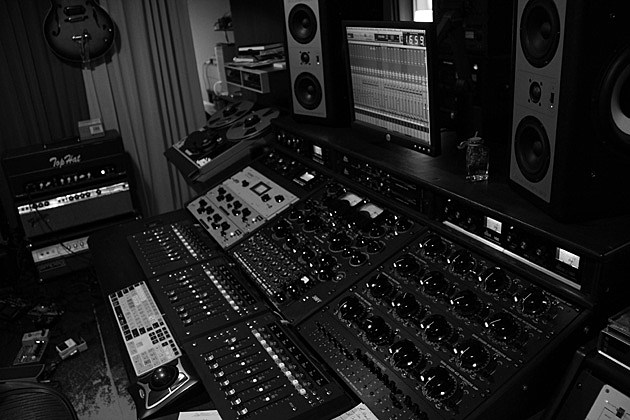
The Genesis of a 'Sunbather': Deafheaven In the Studio
…
In late 2011, we began the slow process of writing the follow up to our debut LP Roads to Judah in between a lot of touring, plan making, member changes, etc. Though a lot of changes have occurred, it has taken a little over a year to finish up this monstrosity.
Before I go into details of the recording process, there are two major factors to point out in the making of this record. Firstly, for Roads, we wrote the songs as a five piece band. There were different creative inputs and personalities that affected the writing and recording of that album. For this, Kerry and I reverted back to the way in which we handled the first set of Deafheaven songs by writing and recording the entire thing ourselves, outside of drums. For a record that clocks in around 60 minutes long, it is definitely a full reflection of our tastes and a representation of where we’re at as a band, three years after conception.
Secondly, before we agreed to going into the studio, we discussed different options with whom to record with. I’m a fan of a lot of different production styles and inquired to certain engineers, but ultimately, after we discussed how we wanted to approach this record, we agreed that going back to Jack Shirley was our best option. Jack has worked on everything we’ve ever recorded and while he is extremely talented, thoughtful, and easy to work with, my favorite part about working with him is that I’m comfortable enough to not be intimidated. We bounce ideas off each other and he helps us sculpt what it is that we’re trying to create. In fact, for this record, he definitely took on the role of producer much more than our previous efforts, which was awesome. It honestly felt like we accomplished this together and it felt great.

Day one starts with drums and scratch guitar. For this record and all upcoming Deafheaven shows, Daniel Tracy has taken the position. From the beginning, Kerry and I definitely wanted to put more of a focus on percussion. Since Roads, we’ve worked with some really talented drummers and Dan is no different. He stepped up huge on this record. For me, drums have always been a bit of an afterthought which is strange because they certainly shape our sound, but as long as they were fast, I didn’t care much otherwise. That is definitely not the case with this record. There are sections where drums absolutely make the song pop, which is a huge development. We use a fairly simple set up; a four piece DW kit. Snare, kick, one rack tom, one floor tom, hi-hat cymbals, and two ride/crash cymbals. For uptempo sections, we close mic with Shure 57, AKG 414, and Audix D4 microphones. For the bigger, spacier sections, AEA R88 ribbon microphones.
Drums end up taking all of day one and a few hours into day two. Our sessions are always around eight hours long, making this the longest time we’ve ever spent on drums. Day two consists of all distorted guitars. Typically, Kerry tracks four layers, tracking each rhythm twice and giving the same treatment for the leads. For these sessions, Kerry is playing his Les Paul. His pedal board consists of a Memory Man with Hazari into a Delta Labs chorus which connects to a Holy Grail reverb and a Digitech Jam Man. For the rhythm, we used a Top Hat Emplexador through a Marshall cab with Vintage 30s. For the leads, we used an Orange Rockerverb 100 through the same Marshall cab. Kerry also uses a whammy bar, which we utilized a lot for this record to create the ‘glide guitar’ sound, which is essentially using the bar to waver chords in and out of tuning to create a dizzying effect; i.e. My Bloody Valentine.
While he does this, I have the pleasure of hanging out with Tre from Deathwish Inc. who has flown in from Massachusetts.
…
More on the recording of the new Deafheaven LP on the following page

…
Day three continues with more guitar work and finishes with bass. We’re using a 70’s Fender P-Bass that plays through a 70’s Fender Bassman 100 and Ampeg 8×10 cabinet. Bass concludes in a timely manner and we move onto clean guitars. For these sections, Kerry is using his Les Paul again but also mixing it up with the Gretsch 6117, which we actually end up using the majority of the time. All of these parts are played through a Fender Blues Jr.
We maximized these clean parts by, on occasion, tracking up to four different guitar parts. Recording always becomes fun around this time because the stressful bulk is completed and we’re able to really experiment with different sounds and space, even using an EBow for the first time.
Days four and five focus on the clean sections and interludes more while day six revolves around small additions and vocals. To accent the clean and interlude sections, we played on a gorgeous Kawai Upright Piano and a 60’s Hammond M3 organ that was mic’d with a Vintage Sennheiser 421. The vocals are treated in a fairly standard way. Truthfully, most of the vocal sound just relies on the performance so unfortunately, there isn’t a lot to say here. We used a echo chamber reverb and during mixing, the takes are fed through an analog tape delay.
The record is still not completed. We have mixing and mastering to get through before the finished product is readied. Jack Shirley will be handling both of these duties as well, which I’m confident in. All of our material is tracked to two inch tape at 15ips with an Otari MTR-90 ii. From there, it’s transferred to Pro Tools HD through Lynx Aurora Converters. This is all finished by being mastered with an Ampex ATR-102 tape machine.

There is a lot that goes on during a recording process and meticulous detail is something that has become more and more important to us as time goes on. When we released ‘Roads’, neither Kerry or I had any idea where it would take us. I feel that if we did, we would have taken more time with it. Then again, I’m happy with its sound because it reminds me of where we were then. It feels, as this next record does already, like an exciting time. An enormous bundle of hope from two young, wide-eyed people who have been lucky enough to be placed in this position.
Lastly, I named the record Sunbather because that’s the feeling it gives me. It is the sadness and the frustration and the anger that comes with striving for perfection. Dreaming of warmth and love despite the pain of idealism.

It will be released in late Spring/early Summer through Deathwish Inc. and I can confidently say that this is the best product we could have come out with.
…











